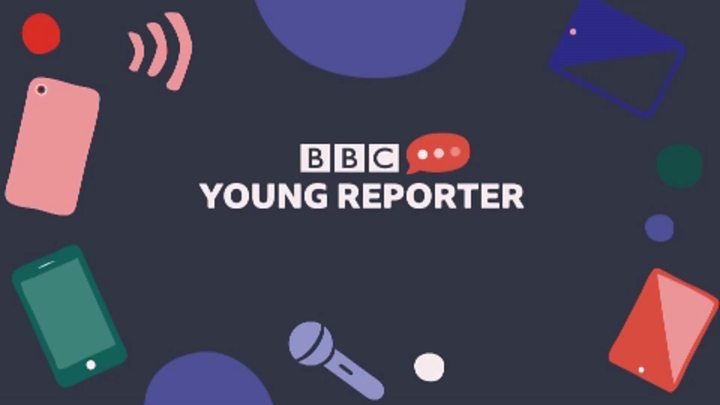Hello, and welcome to the Llantwit School Young Reporters webpage. The committee is made up of a group of both Year 10 and Year 11 pupils, who enjoy English and are interested in the prospect of a pupil-run journalism committee, frequently reporting news, both local and afar to the site’s visitors. As part of this BBC-run scheme, we meet weekly to discuss recent articles and issues that matter to you. Using research and interviews, the committee aims to provide up to date and detailed insights into many different types of stories, affecting areas and people both local and worldwide.
If you have any stories that you’d like us to report on, then tweet us at @LMS_English and we’ll do our best to share your story on our web page.
The BBC Young reporters team
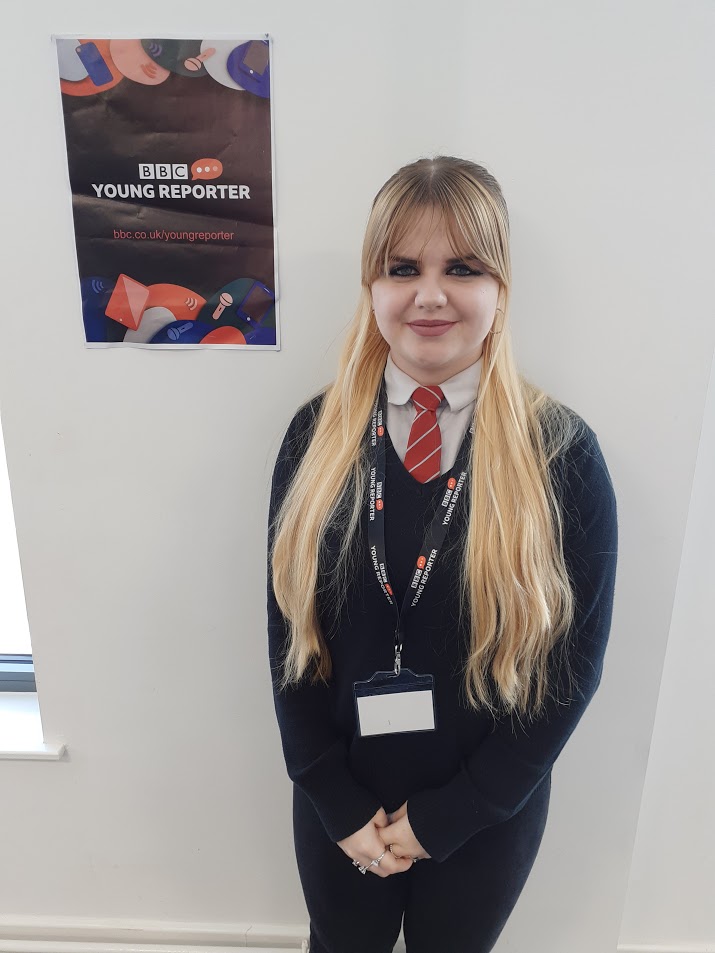 |
Hi, I'm Tia! I am the Editor in Chief for the Young Reporters team. My role within our team is to oversee everything that our members do, read through all of the articles to make sure they're at a good standard before they can be uploaded to our webpage. |
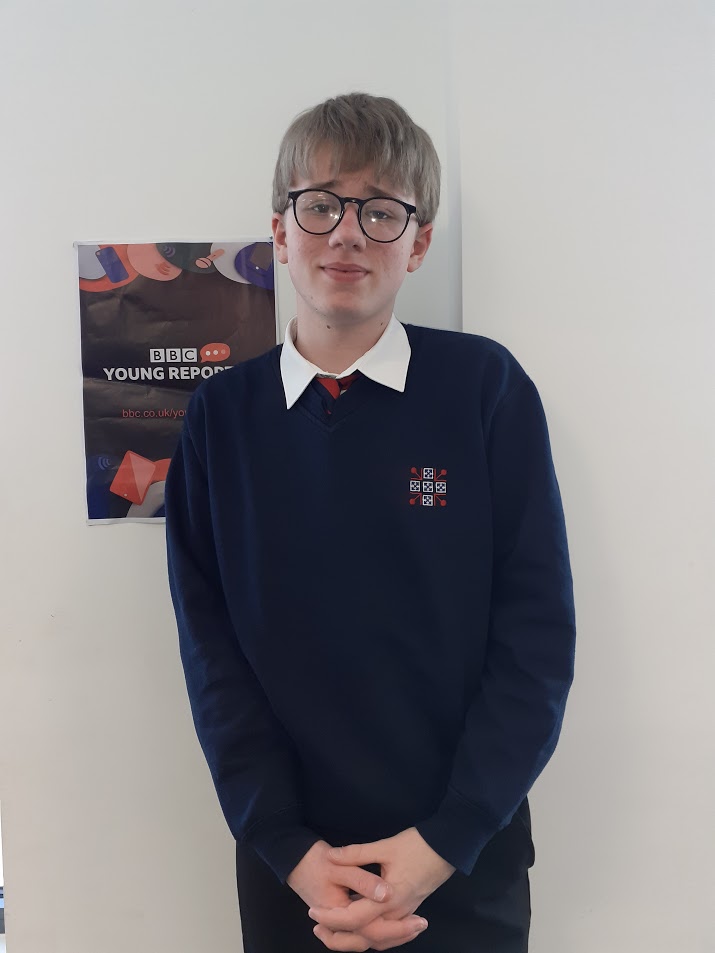 |
Hi, I'm Taran! I am a reporter for Young Reporters. My job is to interview people and deliver information given to me by the researchers, either through written articles or on-screen in our video articles. |
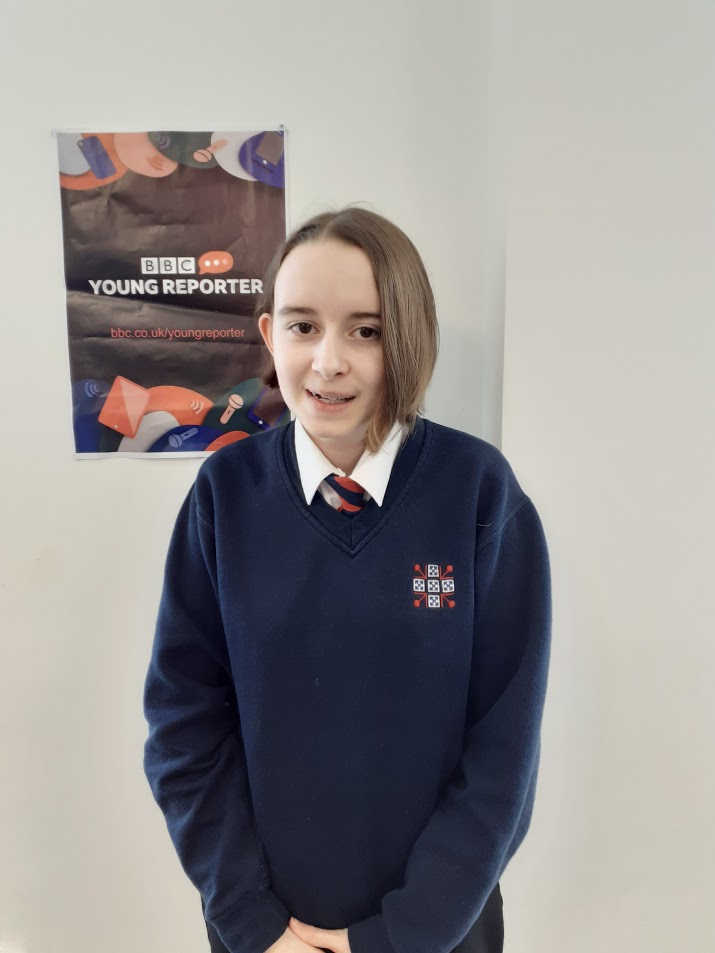 |
Hi, I'm Katie! I am a scriptwriter for Young Reporters. My role is to write the scripts for the reporters when we are creating video articles or radio articles. |
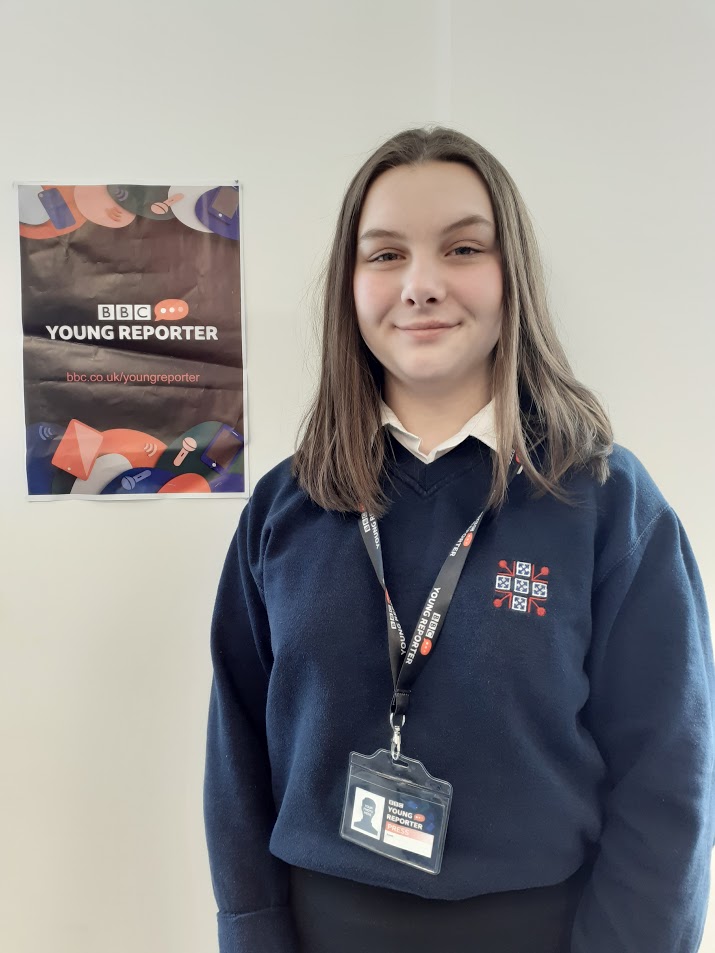 |
Hi, I'm Carmen! I am a reporter for Young Reporters. My role is to interview people and deliver information given to me by the researchers, through written articles, video articles and audio articles. |
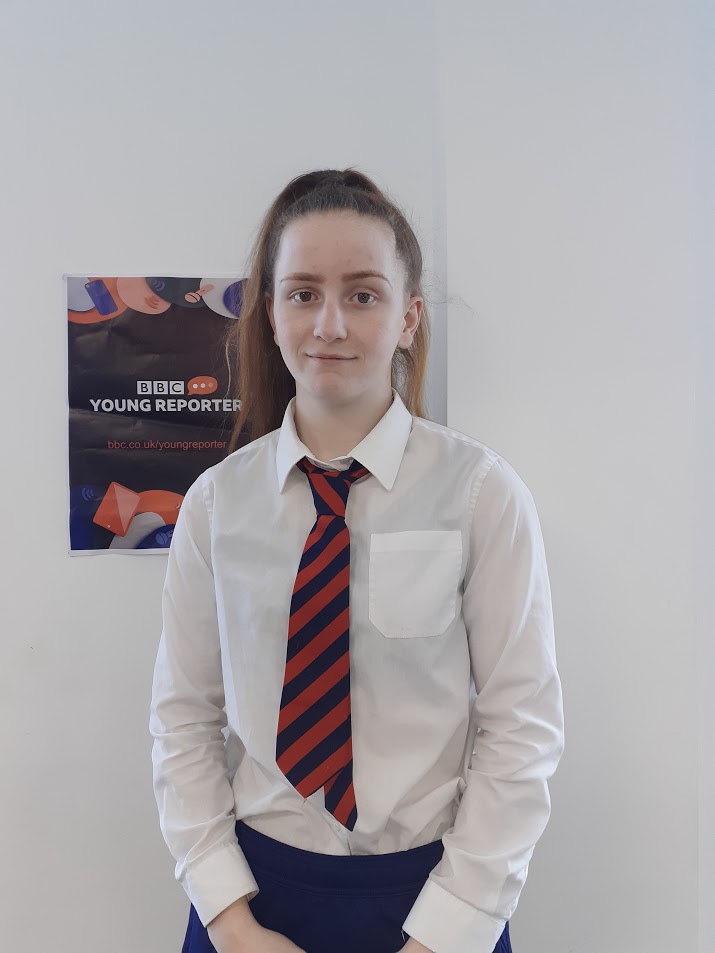 |
Hi, I'm Nicole! I am the videographer for Young Reporters. I am in charge of filming when we are creating our video articles and I have to make sure the video is clear and the speech is audible. |
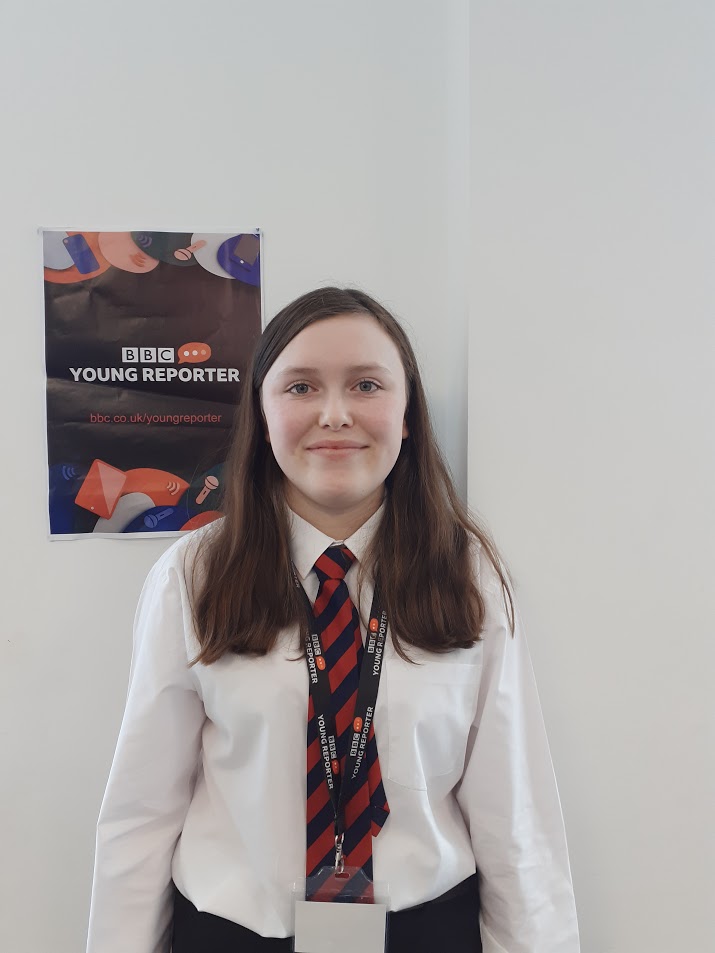 |
Hi, I'm Ellie! I am the Deputy Editor in Chief. My role is to work with Tia and ensure that all articles are completed to a high standard and maintain a good work ethic within our group. |
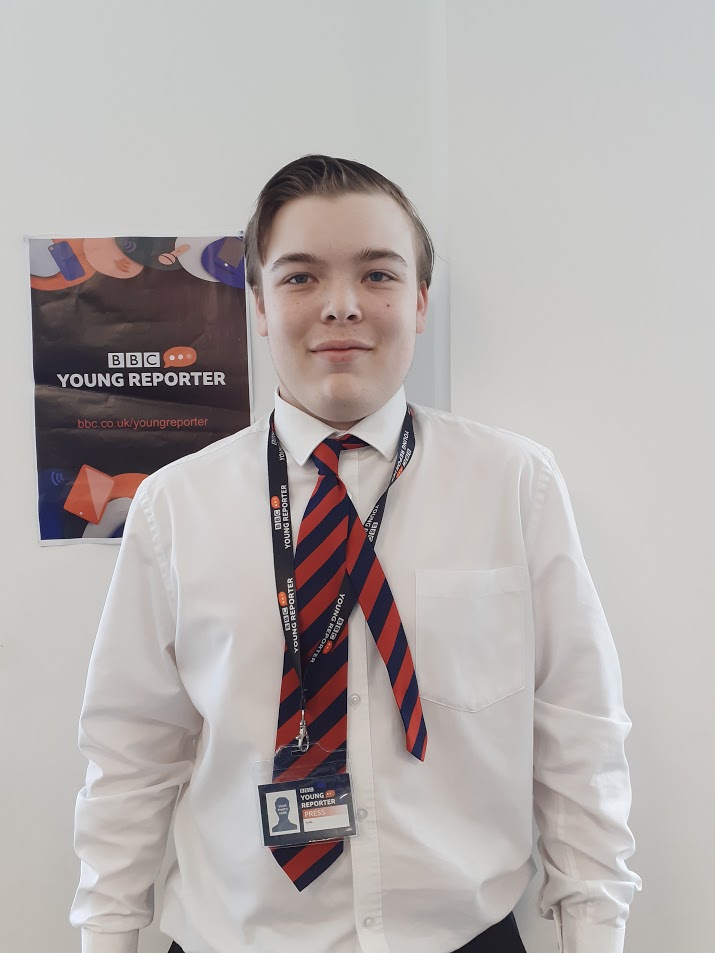 |
Hi, I'm Joe! I am the researcher for Young Reporters. It is my job to gather information for the reporters and scriptwriters and make sure that all the information is correct and up-to-date. |
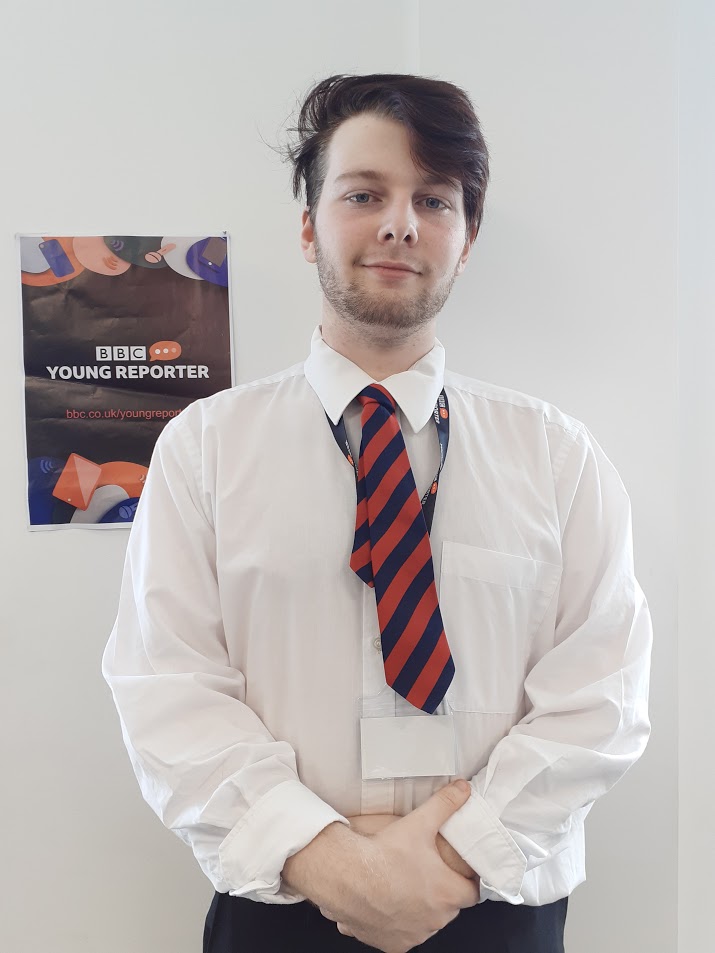 |
Hi, I'm Lloyd! I am the website engineer for Young Reporters, It is my job to upload all of our articles to our webpage and share our work with the BBC. |
RS trip-Krakow
By Ellie Minchinton
On Thursday, October 24th, some students went to Krakow, Poland. On the first day we had a four hour walking tour within which we visited historic places in Krakow. We went to areas like the main square and to the Smok Wawelski which is a dragon statue. This was created around the legend of the dragon. According to legend, a dragon lived under the castle and would terrorize the citizens of Krakow so that it could get food. However, if the people didn't bring the dragon food, it would eat them. Everyone including the king was scared so he said that whoever killed the dragon would marry his daughter. Many people tried but they were defeated, making the dragon stronger. Until one day, a shoe maker filled a sheep skin with sulphur. The sulphur made the dragon so thirsty that it drank until it exploded. The shoe maker then married the king's daughter. We then went to the Hard Rock Cafe to end the day.
On the second day, we went to Auschwitz and Birkenau, two of the many concentration camps in Poland. We had a tour around Auschwitz and we saw the infamous sign, and the blocks. We saw the upsetting collection of belongings which were saved like hair, shoes, suitcases, glasses and much more. We went into the gas chambers and we were shown how they would have worked. We then went to Birkenau, the extermination camp. We went into the areas that the people had to live in and we walked down the train track so we could get a better understanding of how long the people had to walk just to go into the gas chambers. Most of the gas chambers were destroyed before the camps were decommissioned but we saw how big they were by the holes in the ground. In addition, we saw the memorial written multiple times in different languages.
On the third day, we went to the Jewish Galicia museum and we heard a survivor's story about how her parents lived in the ghettos and were then sent to auschwitz. It was very educational to hear a survivor's story. We were then given some free time to go wherever we liked but we had to be back in time for the schindler museum. The Shindler museum was very interesting and we learned all about the Shindler and it gave us more information about the war. We saw more of what the ghettos were like and there were clips showing us interesting things about the war.
On the last day we went to the shopping centre and we went to the salt mines. We learned more about the history of Krakow and we saw the amazing sculptures made out of salt. Many peoip,le licked the walls and some people even licked the floors! We saw the chapel in the mine and we saw how the mine worked. In the main area of the mine we saw salt that had formed like icicles off the ceiling. After the salt mines, we had to go to the airport to go home.
In conclusion, it was an amazing trip for everyone and an experience that won't be forgotten.
Eisteddfod: The real stars of the show
By Nicole Twomey
Every year our school holds an annual event that all students can participate in; the school Eisteddfod. Typically held on St David's day, the Eisteddfod allows all pupils to showcase their talents through competitions and encourage other students to get involved in the arts. The Eisteddfod is a great way of celebrating our welsh culture.
Of course every show needs stars and we always say the students are the stars of the Eisteddfod, but…. This time we say different, the real stars are Performing arts teachers, Miss Toms and Mrs Davis. Every year they put in more dedication into every event that takes place in the school, and they always go above and beyond their call of duty which im sure every teacher and student admires.
A lot of students who don't participate in such events don't realise how much work and determination goes into each performance and running the events and eisteddfod, and as a school we are very proud and thankful for the teachers we have that are willing to put in their all.
Llantwit Major Sporting Stars
By Nicole Twomey
Within Llantwit Major School, apart from the education that the pupils are given, we are very supportive of pupils who compete in sports competitions and represent our school. The school has a large reputation for sports inside and outside of school, with many pupils having been given opportunities that have helped them throughout their career from the school and taken on some big challenges to achieve their goals.
Firstly, I interviewed Shona Heywood, who has an amazing reputation for competing in Taekwondo. She informed me that ¨I have been doing Taekwondo since I was 5 years old and I have loved it ever since. I ended up getting into it after my brother joined and I was eager to show him I was better than him. But now I really want to achieve my black belt, and be a better competitor so I can achieve more in the future.¨ Hopefully we'll see Shona on the big screens in a few years time as a real champion!!
Next, I interviewed William Fyfe, eager to express his passion as a rugby player. He said ¨I started rugby because I wanted to lose weight and become fitter. My first experience was a bit daunting because I was a new player and I didn't know much about rugby at the time. Now I'm going to an academy in England for my A levels which means spending time away from home, but I hope to become a professional rugby player with my scholarship."
Lastly, I interviewed Sammi Morgan. He and his siblings have a massive reputation for gymnastics. ¨I took up gymnastics when I was 3 years old and found a place for it in my heart. So far I have competed against different countries while representing Wales, became British Champion and was selected for the Welsh Squad. I see myself still competing in the future and hope to be as good as I can be¨.
Female Boxing: Rising up through the ranks
By Tia-Jade Allen
In our modern society, female boxing is quite uncommon in sports. Any news about it is often drowned out by the constant chatter of popular sports like football and rugby, or netball and tennis. Even in our school, most talked about are the wins and losses of our school teams against other teams; today it’s time for something new.
In school, we have our very own female boxing champion, rising up quickly through the ranks and on her way to becoming a gold-medalist at the Olympics. Nicole Twomey, in Year 10, is the newly appointed member of the Female Boxing Welsh Squad, and will now be boxing for Wales against other countries with hopes of winning the British Championships and the European Championships.
Nicole has been doing boxing for nearly six years, starting at the age of 9, and currently is the 2-time Welsh Champion in the England vs. Wales Championship, winning the championship by walkover (where the other contestant is disqualified or there are no other contestants to fight against). Having successfully made it onto the Welsh Squad, Nicole has followed her passion by competing in the Wales vs. Ireland Championship, leading her to become a competitor in the British Boxing Championship. Nicole won silver for the Welsh Squad in the British Championships, sadly not making it to the European Championships, but hopes to compete in the Europeans next year. For Nicole, her dream is to make it to the Olympics and become a gold-medal Olympian in female boxing, showing that boxing isn’t just a sport for men. “I love competing in the championships because it’s not all about the fighting - you also make friends when you compete. I’ve got quite a lot of friends that I’ve made from competing.”
“When you step into the ring, you need to have the confidence that you can win the fight, but too much confidence can cost you. I’m always nervous before each fight, but that nervousness is what gets the adrenaline pumping and fuels the fire of confidence inside me, allowing me to fight knowing that I can win.”
Starting in October, Nicole will be engaging in Squad training for a period of 4 months, in which time she will be assessed and expected to complete particular tasks. At the end of her assessment, Nicole will find out if she has a place on the Welsh Female Boxing Team, allowing her to travel around Europe and partake in more boxing championships, including the European Commonwealth, and eventually lead her to compete in the Olympics! Being part of the Welsh Team will open the doors for her to do the Great Britain Squad assessment, and at the earliest be able to compete in the 2024 Olympics!
Undoubtedly, boxing is by no means an easy sport, there are certain requirements that must be met in order to compete. One of those requirements, which Nicole considered to be one of the hardest, was making sure she was the appropriate weight to be able to compete. Nicole had to lose a stone so that she weighed 60kg, her requirement weight to compete. “I couldn’t eat a lot during the day - I could only eat small meals and wasn’t supposed to snack on unhealthy food. I had to eat a lot of salads and green foods, as well as avoiding carbohydrates. I was allowed a ‘cheat day’ though every week, where I could eat unhealthy food, which I normally did on a Saturday.”
Nicole also described how she trains intensely (6 days a week). In an interview, Nicole discussed how she has to do skipping and weights as part of her training to build her strength, as well as bag work and sparring to improve her defense and movement. “In the past, I’ve trained with Rosie Eccles. She’s a Commonwealth Champion and has just become a European Bronze Medalist, she is contesting with English boxer Sandy Ryan for a chance to compete in the 2020 Olympics. She taught me some of my skills in boxing. Training with her was great - we’re still friends now.”
“I love boxing. In the future I’d like to compete in the Olympics and get the gold. I’d also like to be able to make money from boxing, and when my coach passes on the club where I train, I want to run the club and help other young boxers like me to train.”
Well, everyone’s rooting for you Nicole in your fight for success, and we all wish you the best of luck in your upcoming matches. As said in boxing, “Go knock ‘em dead!”
News vs Entertainment: Fight!!
By Joe Minchinton
Recently media platforms such as films and video games have been under fire. Why? You may be asking. It's simple, the release of the Joker film has sparked controversy due to its villainous main character. It has been hailed as a cause of shootings across the world despite the distinct lack of violent outbreaks. In fact, the biggest outbreaks have been a small fight between two people, two weeks after the film's release. Hardly the havoc the media warned us about. On top of this, people have been noticing the rise in fear-mongering over minor events and even treating the use of the f-word in a movie rated 15 as a sign of the coming apocalypse. Though obviously it could be due to the controversial topic, however, there were hardly any issues over the release of a similar film the taxi driver. With a similar plot and protagonist. The film faced no such controversy at the time and has been graced with critical acclaim. Many see this as a result of news is easier than ever to manipulate and fake, as they choose what story they want to tell and what facts they want to present. Not to mention “Joker” suffered no such scandal throughout its release, while there was a case of violence using machetes in a screening of Frozen 2. In my opinion, this demonstrates that any situation can cause violence so to narrow it down to films that deal with issues through unconventional means is ridiculous.
Another example of this issue is the recent attacks on video games for similar reasons. The debate began with a statement released by Trump following the shooting, in which he stated, “We must stop the glorification of violence in our society. This includes the gruesome and grisly video games that are now commonplace. It is too easy today for troubled youth to surround themselves with a culture that celebrates violence. We must stop or substantially reduce this, and it has to begin immediately. Cultural change is hard, but each of us can choose to build a culture that celebrates the inherent worth and dignity of every human life.” A statement similar to another of his from 2012 which states “ video game violence and glorification must be stopped-it is creating monsters” so it is obvious that he feels strongly about this issue. However, reports show that while US citizens, on average, spend the 3 highest amount on video games they own the highest rate of gun violence in the top ten. 4 times that of the second-place result, Canada. While there is a connection between gaming and aggression, which seems more likely to you? That mentally ill people who are dealing with a lot of issues are playing games as they are a way to find enjoyment in solitude, or that by playing games previously healthy and happy people are playing games and immediately turning violent. It appears that video games and even the internet are being used as a scapegoat to avoid discussing the real problems like gun control because while people are trying to defend the innocent mediums, the issue of gun control is forgotten about by the general public. This is not a sustainable system and is in desperate need of correction.
In fact, despite these claims, a report from the FBI data has shown a decrease in violent crime over the last 30 years, which coincidentally includes the majority of these violence causing video games. However, this data did monitor a rise between 2015 and 2016, though the rate has now dropped to the level before this. But why is this? Well, criminologist, Richard Rosenfeld claims, “The uptick in homicide was more likely associated with a crisis in police legitimacy: People, especially in disadvantaged minority communities, drawing even further back from the police.” This clearly clashes with the consensus reached by politicians.
In conclusion, these claims that beloved entertainment mediums are causing all our issues are at best misguided and at worst, purposefully deceptive. By feeding these hollow claims we are allowing those in positions of power to distract us from the real issues. This should serve as a reminder that we can no longer take the information we are given at face value and must instead educate ourselves to make a real difference. Through this, we can spark real change.
A look at current politics!!!
By Taran Ellerton
The UK general election was thought to be one of the closest elections to date, with all three of England and Wales’ parties putting up extremely good campaigns. So how did the Labour party suffer such a catastrophic defeat? How did Jo Swinson the Liberal Democrat leader lose her seat? And why did the Scottish National party win so majorly in Scotland and what will that mean for the future of the United Kingdom? I will look in detail about the campaigns of the three main parties' campaigns, the results and the future of our country. As well as this, how the Labour election is going to affect the party and how the continuation of Brexit will be vital for the future of our country.
Campaigns
The Conservative Party won the election, right? So they must have had a strong campaign? This is debatable. Some people would argue that Boris Johnson did a massively successful job at convincing the nation that he was going to “get Brexit done”. Yet some people only remember the Conservative campaign for them skipping climate debates, despite pledging a climate emergency in May of the very same year, and their leader Boris Johnson hiding in a fridge in order to avoid committing to an article with Good Morning Britain Hosts Piers Morgan and Susanna Reid. But Johnson and his Party must have done something right in order for him to win.
In interviews with many people after the fact, Johnson’s success came mainly down to two things, “get Brexit done”, and the Brexit party. Boris Jonson really did love his slogan “get Brexit done”, in fact, he used it 22 times on December 12th alone. This really touched home with many leave voters as well as those people who are just fed up with Brexit. Many leave voters were annoyed that their votes were not being respected and that any other would not honour their vote. Some people who were done with the 5 agonising years of Brexit, were tempted by the neutral phrase of “get Brexit done” which did not promise a hard Brexit or a trade deal, it simply just stated that the Conservative was going to, well, get Brexit done.
Like I said before, the Brexit party really did help the conservative party win this election. From being a real frontrunner at the beginning of the year, when the party was first formed, they ended up not winning a single seat. Some would argue that this was due to pure arrogance however some would disagree. You see, the Brexit party did not run in any of the Conservative’s previously won seats; many people would say that the Conservative party has a very similar ideology to the Brexit party and so it would have been wasteful to waste a seat by splitting the same voters in two for seemingly no reason. After all, Nigel Farage offered to make a leave alliance with Boris Johnson to win the election and complete a hard Brexit.
The Results
This General Election gave Boris Johnson exactly what he wanted. A sizeable majority and the ability to pass through whatever rules he wants. As well as this, the SNP earned 48 seats, this means that they only lost 11 seats but gaining 13, including Dunbartonshire East which was the constituency of former Liberal Democrat party leader Jo Swinson. Though positive for some this election proved disastrous for Jeremy Corbyn and the Labour party. This election was also bad for the Liberal Democrats. Losing 1 seat, although this may not seem like a lot, the party was amped up to be the party for remainers and the party that could take on the Labour party and the Conservatives. Looking at the total votes gained it may appear that they did that, winning roughly 3.5 million votes to the Conservatives and Labour parties 24 million and 10. 2 million votes respectively.
The Labour Leadership Election
Following the Labour party's worst defeat in recent times, Jeremy Corbyn announced that he would continue being the party’s leader until the party finds a new leader. To be eligible to become the party’s leader a candidate must meet a certain number of prerequisites. These prerequisites include:
- Nominations from 10% of MPs and MEPs (Members of European Parliament*)
- Support from 5% of constituency Labour Parties
or
- Nominations from 3 affiliated groups including 2 trade unions.
There were five candidates who met all of the requirements and were eligible to become the next Labour leader these five people were:
Rebecca Long-Bailey Lisa Nandy Keir Starmer Jess Philips Emily Thornberry
Keir Starmer had an overwhelming majority in the first round being endorsed by 88 MPs and MEPs, he was followed by Rebecca Long-Bailey and Lisa Nandy who had 33 and 31 nominations respectfully.
Despite all of the five candidates surpassing the requirements to move onto the second round only three received sufficient nominations to be put on the final ballot that was sent to voters. These three people were Keir Starmer, Rebecca Long-Bailey and Lisa Nandy
Voting and Polls
Now that we have reached the final ballot, voting has been opened. A Labour party member could start voting February 24th and voting will end midday on April the 2nd. This will result in the announcement of the new Labour leader on April the 4th.
So who will win? Basically, it's almost 100% going to be Keir Starmer. He is currently being trailed by Rebecca Long-Bailey who has a 7% chance of becoming the next Labour Leader. Then Nandy is following in last place with only a 4% chance of becoming Labour leader.
Brexit
Boris Johnson kept to his promise of leaving the European Union on January 31st. However, there are still many stages the UK must go through before we have officially left the EU. We are currently in a transition period which will last eleven months (which will last until December 31st). Until the end of the year the United Kingdom will still be under all the strict and sometimes controversial rules and regulations. There are many aspects that both the UK and the EU are going to have to discuss, but both sides have said that they are not going to be lenient and want Brexit to be done their way. Some of the things they will need to agree on are:
- Law enforcement
- Data Sharing
- Security
- Aviation standards and safety
- Access to fishing waters
- Gas and electricity supply
- Licensing and regulation of medicines
To conclude, Boris Johnson's government will bring big shifts to the UK and with Johnson’s plans for Brexit will still keep it a big topic in current politics. The Labour election will be pivotal for Labour’s success in the next election. Although with the recent outbreak of Coronavirus, Covid-19 all of these plans could be put on hold in an attempt to control the pandemic.
*This stage of the election was completed before Brexit
China, Hong Kong and The Lessons We Need to Learn
By Katie Tulloch
China’s economy is one of the largest in the world and is growing even bigger. The country is getting closer and closer to becoming one of the world's leading superpowers but human rights disputes, protests and its status as one of the last standing communist states are leading to concerns about the future of the world itself.
Between July 2015 and November 2017 over 200 lawyers, legal assistants and activists were detained in China for criticising the government’s regime. The president of China is Xi Jinping, the highest-ranking official in China since 2012 as General Secretary of the Communist Party of China, President of the People’s Republic of China and Chairman of the Central Military Commission. Xi Jinping has become infamous online for censoring mentions of seemingly innocent things, such as Winnie the Pooh, within China after images began circulating comparing the President to the cartoon.


Censorship is a contentious issue in China. President Xi sees censorship as necessary to ensure absolute loyalty to the government while many call it a serious breach of the right to free speech enjoyed in countries around the world. The issue of free speech has become more apparent since February when Hong Kong’s local government introduced a bill that has shaken the country to this day.
Hong Kong and China have a complex relationship. Up until 1997, Hong Kong was a British Colony but was given back to China under an agreement known as ‘one country two systems’. This agreement meant that Hong Kong was still technically part of China but kept rights denied to Chinese citizens. These rights didn’t just include the right to free speech but also the ability to use the internet freely and the right to free assembly. Hong Kong was effectively it’s own country with the added element of China’s input. China had promised that this system would remain until 2047 but many people from Hong Kong are under the impression that China is already slowly removing it’s freedom. Carrie Lam - Hong Kong’s Leader - was given the position by a Pro-China committee and Hong Kongers argue that she abides by China’s bidding.
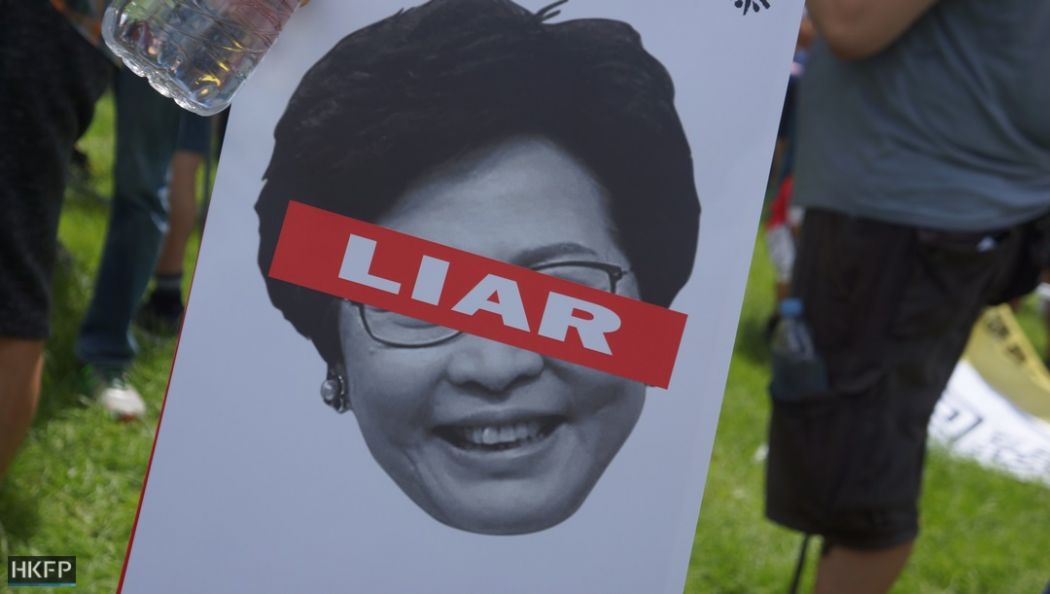
In February, Hong Kong’s government brought forward a bill that would let those accused of crimes within Hong Kong to be sent to places where courts are controlled by China’s Communist Party. Carrie Lam has claimed that the bill allows for justice for victims while critics claim China would use the bill to charge anti-China Hong Kongers with fake charges.
On June 9th hundreds of thousands of people marched in Hong Kong to challenge the bill. On June 12th police began to use physical force against protestors including pepper spray, batons and tear gas. Pressure on Carrie Lam led to her suspending the bill on June 15th. Protestors wanted Lam to withdraw the bill completely but this was refused. The marches continued and a non-violent march on June 16th was the biggest in Hong Kong’s history, around two million people are reported to have joined it.

Violence between young protestors and the police have continued and in July hundreds of them stormed into the Legislative Council Building. On the same night around 100 men carrying metal rods attacked and injured protestors (as well as bystanders) at a train station. The police arrived at the scene very late and initially did not make any arrests. Violence from both sides has increased.
Over the past week the campus of Polytechnic University in Hong Kong has become the home of a fierce battle raging between protestors and the police. PolyU has been full of protestors over the last few days. Fires have been lit to block police from entering the building and it has been reported that police are refusing to let protestors leave peacefully.
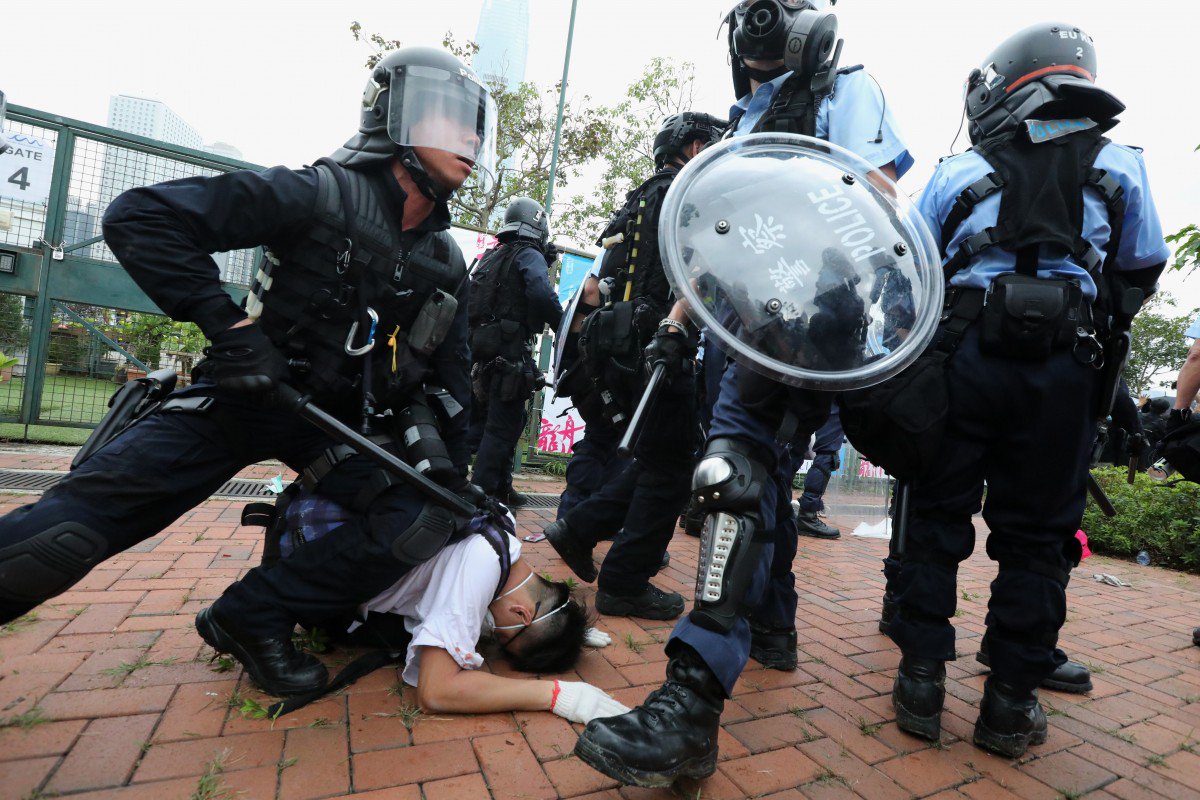
The Chinese Government has stood behind Carrie Lam but has not provided much assistance to her. Chinese officials have made statements warning protestors but Xi Jinping has not publicly made any comments on the situation. Hundreds of arrests of protestors have been made and the political unrest seems to have no end in sight.
But how does this relate to the UK? Britain and the Chinese Nationalists were allies during both World Wars but the relationship became more tense after the Communist Party of China took over in the late 1940s. The British government insisted on keeping Hong Kong. In 1997 the UK agreed to hand over ownership of Hong Kong to China and agreed on a strategic partnership. Over the next decade the two governments became closer and closer and in 2010 both countries pledged to work closer in military operations.In the past 10 years Britain and China have made trade deals worth billions of pounds. In July Boris Johnson stated that his government will be ‘very pro-China’ and voiced support for Xi Jinping. In regards to the Hong Kong protests, China’s ambassador to the UK warned British politicians by saying that Britain should ‘refrain from saying or doing anything that interferes or undermines the rule of law in Hong Kong’.
This puts the UK in a difficult position. Do they want to defy China and cause conflict which could easily lead to nuclear war and the end of the human race? Probably not, but by adhering to China the UK is fueling its power. Everything seems to point in the direction of China ruling the world unless there is a drastic change. I have no idea what that change needs to be but what I do know is that, right now, governments are stepping on eggshells around China and in the future we could be being ruled by this very questionable figure:
My strange addiction: I think I’m obsessed with Katie Hopkins
Katie is an English media personality, columnist and former businesswoman. She earnt recognition by being brutally honest to the wild and wonderful world.
...And I’m obsessed
It all began with Celebrity Big Brother in 2015 when I first encountered her. She was funny and I resonated with her humour. It was not until very recently that she popped back onto the controversial scene Her outspoken views have caused a lot of upset within many communities, like the animal rights activist community. Many of her beliefs include not liking parents, naming their children after geographical locations (beware, her only daughter’s name is India), being anything other than white, racial profiling and xenophobia. During many interviews, Hopkins has expressed her distaste for many groups of people including Muslims, gipsies, multicultural people, feminists, and the obese. She has also feuded with many British personalities such as Gemma Collins, Simon Cowell, Charlotte Church, Piers Morgan and Stormzy.
To ‘reward’ Hopkins and her shenanigans, she was recently invited to the Campaign to Unify the Nation Trophy award from the Cape Town Collective for Freedom of Speech, back in January. Little did she know that the award was a practical joke pulled by South African - British resided youtube star Josh Pieters as an attempt to humiliate Hopkins. The so-called Cape Town Collective for Freedom of Speech group consisted of Josh’s dad, the lady who does the announcements on the London underground and a former member of the Ku Klux Klan (who, in reality, had nothing to do with the whole operation). In addition, he engaged the services of some actors to form a ‘real’ audience, booked the swanky Four Seasons Hotel in Prague, had a trophy engraved, and flew out Hopkins to enjoy a top-class meal.
Below: Katie and the so-called Cape Town Collective for Freedom of Speech after receiving her award.
It wasn’t until after the ceremony that the hoax was revealed to the world. As Hopkins was banned from Twitter due to ‘spreading hate’, Pieters posted a screenshot from the video of the whole plan so that the public could revel in the delight of Hopkins finally getting her comeuppance.
However, Hopkins’ was bound to find out. Her reaction to this extravagant prank was eventually revealed when she uploaded a picture from her at a real awards ceremony and captions including ‘I turned up for free’ and ‘I was equally kind and generous to my hosts’. Proving that she has, again, found a way to make herself look like the bigger person. Interestingly, she has not since appeared in the media - public perception is that she is hiding from her shame and embarrassment. Once again.
Pre-2020 articles
Aspire Scientists Shoot For The Stars!
Aspire students visit ‘We the Curious’ to learn about space and the Bloodhound SSC.
On Monday the 14th of January, 22 students from the Aspire group (a group set up for students achieving in the three main subjects: English, Maths and Science.) went to We the Curious, a science centre in Bristol. This trip had the main purpose of learning about the Bloodhound SSC and trying to make the fastest car. The bloodhound is a car in the progress of being built. It has taken so long because the engineers want to get the top speed to 1000mph. However, our goal was only over 30mph.
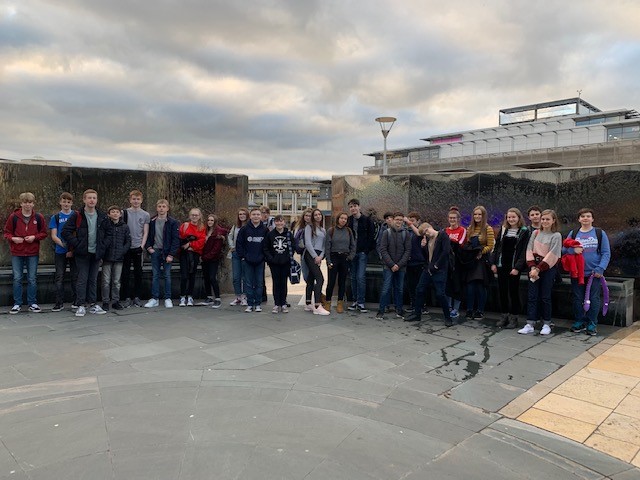
We started the day at 7:45am when we left the school for Bristol. After the long journey, (approximately 2 hours and 15 minutes) we arrived at the science centre. We were greeted by our supervisor who took us straight to our area to put down our bags. Promptly after, we proceeded to a room where we learned about the Bloodhound SSC and we were shown pictures of previous record breaking cars. We were also shown an example of an aerodynamic foam car in a wind tube to show us what happens to the wind when something is aerodynamic. As soon as we had finished learning about the science behind the Bloodhound SSC, we were allowed 5 minutes of free time because we finished early.
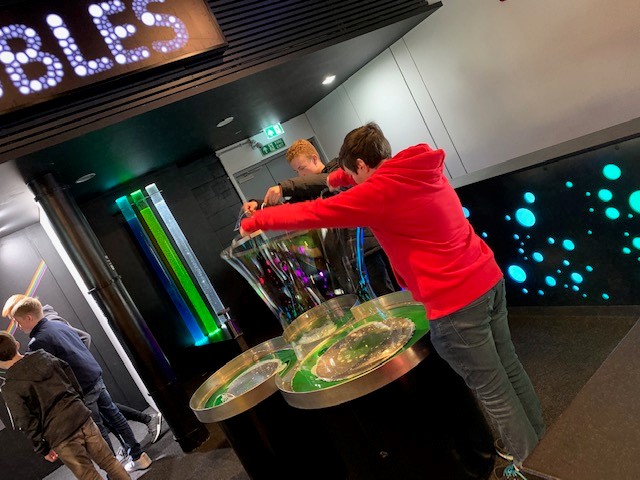
During this break, everyone was allowed to explore and play with things on the floor we were on. There was a variety of things to do, for example, you could make giant bubbles or play with the giant board. After around 5 minutes, we were taken a room in which there were the materials and tools for our cars. First, we were told some safety precautions then shown how to use each tool. Having gone through all of this, we were allowed to start building. We were given an outline of where we could and couldn’t cut but other than that, we were free to do whatever designs we wanted. Once we had cut our outline with a saw, we had to sand down the edges and surface. Then it was time for (arguably) the fun part.
We had to use the hammer to put the metal rods into the wheels. Finally, we had to decorate the cars and screw in the eyelets. These were to enable the cars would stay attached to a thin metal wire.
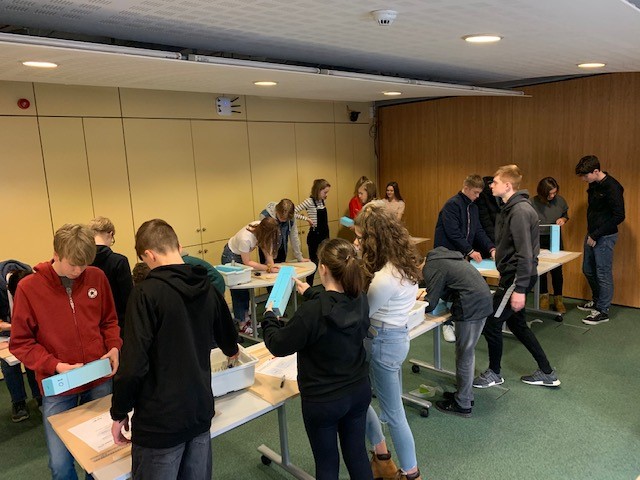
During lunch, we were able to explore. The most popular item being the water turning hamster wheel! Soon after, we headed to the planetarium where we learned about constellations, a nebula and black holes. We were shown what would happen to the other planets (including Earth) when the Sun dies.
To end the day, we tested our rockets! Our target was to pass 30 mph but the record was 60 mph. After an exciting competition, we found our top two. In second place, with a close speed of 59.7mph came Bethany Said and Ellie Minchinton. However, in first place with a record-breaking speed of 65.6mph came Sofia Hague and Joe Minchinton.
By Ellie M
British Sign Language: Why is it important, and should it be taught in schools?
One of the greatest, most apparent issues in society today is communication, and how people are still struggling to communicate with people. Language barriers are the biggest cause of this, as often people aren’t fluent or completely cannot speak a particular language which they may need in the future. This is why we’re taught to speak the modern foreign languages (MFLs) in school, which include French, German and Spanish. It’s a brilliant idea if we want to be a translator or go abroad, but when are we going to need this skill when we’re in our own country?
It’s unlikely that we ever will. However, there is one language skill that most people don’t have that everyone should have; the ability to speak Sign Language.

Deaf people, particularly those people who have been deaf from birth, can’t communicate with us through talking, the way that most of us do. As a way to ‘jump this barrier’, Sign Language was created. For anyone who doesn’t know what Sign Language is, it’s using your hands and parts of your body to create specific symbols representing words/things. There are different Sign Languages, based on where you’re from, but in Britain, we use BSL (British Sign Language) or Makaton, the nationally recognised Sign Language. Personally, Sign Language is an essential language that everybody should learn, especially since you’re more likely to need to use Sign Language in your life than you are to use a foreign language, like French or German.
The one thing that really annoys me, when it comes to learning languages, is that we learn foreign languages in school for free, but unless there’s a school-run club, we have to pay to learn Sign Language. We choose to speak a language like French - it may not be completely necessary, but more for enjoyment or your own personal merit. Deaf people have no choice. Sign Language is the only language they can speak, otherwise, they have no way of communicating. They don’t choose to be deaf, for them, Sign Language is a necessity. How is it fair that we can converse with people from other countries, yet we can’t communicate with people from our own country? It’s not.
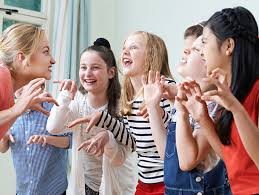
During a recent visit to the Senedd in Cardiff, I was told all about what the Welsh National Assembly are working on. At the moment, their biggest project is creating a whole new school curriculum, and one adaptation they hope to put forward is for British Sign Language to be included in this curriculum. It is believed that by 2022, there will be a completely new curriculum for all schools in Wales, where they will hopefully be teaching British Sign Language. Children and adolescents should have the opportunity to learn Sign Language in school alongside the MFLs. According to the Linguistic Rights and the UNCRC Children’s Rights, we have the right to speak our own language. We shouldn’t be denied the right to speak with other people just because they have to speak a different language.
Being able to communicate is so important. It gives us a sense of belonging and allows us to be who we are. That’s why it’s even more important for deaf people to speak Sign Language, so they feel special and feel like they belong, and that’s why it’s most important for us to be able to communicate with them. So we can tell them they’re special, so we can tell them they belong, and so they know they’re not alone. Sign Language is just as important as any language. It should be respected as so.
By Tia-J A
Britain’s Knife Crime Dilemma
Two teenagers, aged seventeen, were both killed in separate incidents in London and Greater Manchester during the same weekend. These incidents, combined with more knife attacks over the last couple of months, have brought attention to the rapidly growing problem of teenage knife crime in the UK. Data from the NHS shows that the number of cases of under 16’s being treated for stab wounds has risen by 167 cases from 2012 to 2018. Many people are now calling it a “crisis”. While many MPs have been discussing possible solutions to knife crime, this week Theresa May has clearly been too busy for that and has instead been clashing heads with the Metropolitan Police Commissioner Cressida Dick and the Home Secretary, Sajid Javid. A lot of criticism has been directed at the PM after she said that the police cuts she was in charge of were not linked to the rises in violent crime. Sajid Javid has displayed his strong disagreement with this statement, and one police chief has called May’s claims “disgraceful”.

(Office of National Statistics, ONS)
In an attempt to find some sort of solution, Sajid Javid is planning to hold a meeting with seven police chiefs from areas of high knife crime. Officers from South Wales, Yorkshire, London and Greater Manchester all will be in attendance. While Sajid Javid is organising all of this, Theresa May has enlightened the British public as she has told the cabinet that the two recent teenage murders were “absolutely appalling” (as if anyone thought different). Jeremy Corbyn, the Labour Party leader, criticised Theresa May stating that there was not a direct link between cuts in police numbers and violent crime. On the 5th of March, he sent out a tweet that read “Young people shouldn’t pay the price for austerity with their lives.”
Many people, including the former police chief, have requested a ‘knife crime tsar’ to be in charge of the money being used to lower the number of victims of knife crime. A tsar is a “person appointed by government to advise on and coordinate policy in a particular area.” Graham Mcnulty, The Met's Assistant Commissioner, said officers working in the violent crime unit worked extended shifts over the weekend, and police have conducted “over 2,500 stop and searches in the last three days alone”. Unfortunately, officers working extended shifts every weekend is not a permanent solution and could lead to burnout of the police force. Gavin Williamson believes the solution is deploying the Military to help overcome the knife crime epidemic.
The general public have been sharing the thoughts and opinions over social media platform, Twitter:

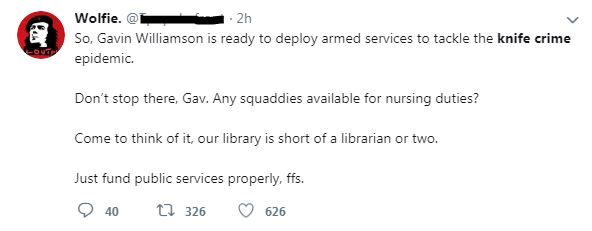


By Katie T
Scientists Discover New ‘Super Earth'

Scientists have discovered a so-called ‘Super Earth’ orbiting, the second nearest star system to the Sun, the Barnard Star System. Scientists believe the planet is roughly 3.2 times as massive as Earth. It has been described as a "frozen, dimly lit world" that takes roughly 233 earth days to orbit its host star. The host star, named after astronomer E. E. Barnard, is a red dwarf that barely illuminates the exoplanet – making it particularly hard to locate. According to astronomers, the light that Barnard's star gives to the ‘Super Earth’ is equivalent to just 2% of the energy that Earth receives from the Sun. This means that although the ‘Super Earth’ is closer to Barnard's star than we are to the sun, the planet is actually close to what is known as the “snow line”. The “snow line” is a region of orbit where it is cold enough for water on the surface to turn to ice. This explains why scientists describe the new discovery as a “freezing, shadowing world”.

It is presumed that the new ‘Super Earth’ has an approximate surface temperature of 170°c below zero, making it one of the coldest known things in existence. Barnard is believed to be an ancient star that could be twice as old as our sun. It is largely inactive (hence why the new ‘Super Earth’ is so cold). Scientists believe that Super Earths are the most common type of planet to form around this type of low-mass star. This boosts the credibility of the new discovery. The incredible discovery was made by scientists combining measurements from instruments mounted on telescopes around the world. Lead Scientist Ignasi Ribas, of the Institute of Space Studies of Catalonia, said: "after very careful analysis, we are 99% confident that the planet is there." He goes on to say, “However, we'll continue to observe this fast-moving star to exclude possible, but improbable, natural variations of the stellar brightness which could masquerade as a planet." They were able to uncover the location of the planet by using the “wobble” a planet created when gravitational forces pull it into orbit. Furthermore, the stars give off light which can be dismantled into colours and wavelengths. As the star moves away from Earth, its light spectrum shifts red – and the wavelengths become longer. One question still remains: will humans ever colonise another planet?
By Wesley B
Female Boxers in Wales
In the United Kingdom there are 10% of women who
do boxing within the Wales, and 30% of women who
do boxing within England and Scotland. In recent years,
women boxing has become a more popular sport.
People do boxing because they have either ended up in
a situation that involves physical violence, or do it
because they want to be known for something in the
future, or want to become mentally and physically
stronger as a person.
Boxing is good for developing your body image, health
and using your head. Thinking is one of the best ways
of developing your mind set (getting into a fight and
thinking first), it makes you think about what you can
do to get out of a bad situation.
Women do boxing because we believe that not only
men can box, as us girls are being told that boxing isn’t
for women. However, we think that every sport is for
both genders, and we have the right to try every sport,
and will earn more money than men since female
boxing is not common.
You don’t have to be fit to get into the sport, you can
just turn up to any boxing gym and ask to train, you will
be different as a person physically and mentally.
Us, as women, believe that we will earn more money
because not many women do boxing, and women will
be given more opportunities to be known as great
boxers.

By Nicole T
Brexit: What is it and How Will it affect us?
Brexit is a very vast topic in today's society and it will be one of the biggest political shifts in today's government. However, not many people know the facts or what it could do to our country. Most of people’s knowledge comes from fake facts or the ‘Leave and Remain’ campaigns, and at this point we know that the leave campaign’s main persuasive facts were misleading. We are going to give you the hard facts right down to the meaning of Brexit, Britain’s Exit.
The Vote
On the 23rd of June 2016 a referendum was held to decide whether we should remain in or leave the European Union. Across all of Great Britain, 51.9% people voted to leave the EU, whereas 48.1% voted to stay. Over 30 million people voted in the referendum - 71.8% of the British Public. In England 53.4% of people voted for Brexit, whilst 46.6% did not. In Wales more people also voted for Brexit to go ahead with 53.4% meaning 47.5% voted to remain. However, in Scotland they voted to remain in the EU; 62% voting to remain and 38% voting to leave. Northern Ireland also voted to stay in the EU, with 55.8% voting against Brexit and 44.2% voting for Brexit.
Everyone over the age of 18 were allowed to vote. Different age groups voted differently in the referendum and this caused major controversy. 82% of voters aged 18-24 voted to remain in the EU. Roughly 68% of 25-34 year olds voted to remain. 55% of voters aged 35-44 similarly voted to remain in the EU. The opinions change once we start looking at voters aged 45+ with 55% of people aged 45-55 voting for Brexit. This margin gets even bigger when we start looking at 55-64 year olds where 68% of voters voted to leave the EU. This only increases when looking at voters aged 65+ where 66% of voters voted against remaining in the EU. The younger generation clearly does not have a similar view to the older generation and many did not like the fact that they swayed the vote from remaining in the EU to leaving the EU. The main argument proposed was that the elderly would not be around as long as the younger generation and it was their prolonged future that would be affected by this decision.
Aftermath
Immediately after the results of the referendum were announced, David Cameron resigned as Prime Minister. Despite backing the remain campaign throughout the race, Theresa May became the next Prime Minister due to her opponents dropping out and was handed the keys to 10 Downing Street on the 13th of July 2016.
On the 29th of March 2017, about 7 months after being made Prime Minister, Theresa May and the Conservative party decided to trigger Article 50: the European Union exit clause. Triggering Article 50 meant that the United Kingdom was formally starting the process of leaving the EU, but the next event in the Brexit fiasco shocked everyone… On the 8th of June 2017, Theresa May called a general election, the result of which was almost certainly not what she was hoping for. Theresa May ended up losing her majority in parliament, but Arlene Foster of the DUP (Democratic Union party, the party that won the Northern Irish majority) ended up saving her by making a deal with the Conservatives, allowing May to continue in her role of Prime Minister. If the Democratic Union party had not helped the Conservative party they would not have a majority or continue being in power, this would have meant that everything happening in Brexit at the moment would have been different.
Later that month, on the 26th of June 2017, the UK and EU began formal negotiations on Brexit. Later that year on the 13th of December, Conservative rebel MPs (these are MPs of a party that go against what their party tells them to do) threw a spanner in the works by siding with the opposition and forcing the government to guarantee a vote on the final Brexit deal. A European court has ruled that the UK can decide to stop the process. Alternatively it can be extended if all 28 EU members agree, but at the moment all sides are focusing on that date as being the key one, and Theresa May has put it into British law.
Young people’s opinions
The majority of teenagers have no clue what Brexit is or what it even stands for (Britain’s Exit). 93% of 12-16 year olds said they were uncertain of what Brexit means for our country. Television shows like ‘Love Island’ also show teenagers that adults, the people voting, also have no idea what is actually happening, ‘Does that mean we’re not gonna have anymore trees?’ - Hayley Hughes, Love Island 2018.
TV shows like these show young people that no one really knows what will happen to Britain after leaving the EU, which gives later generations little faith of what will happen when they are possibly in similar positions in years to come. Topics regarding politics should be discussed more amongst teenagers so more can understand what is happening when they become the next voters. Schools should teach culture and politics to provide practical use after school or college. This would be beneficial as we want our children to live in an idealistic world, and they are not capable of that if no one shares information of what is currently happening with them.
Brexit deals
A brexit deal is the ties Britain has with the EU after Brexit goes ahead. One of the possible outcomes of Brexit is a no deal. This means that Britain would not be connected to the EU at all. According to Dr Simon Usherwood, a reader in politics at the University of Surrey. “On the 29th March next year, the UK would leave the EU and everything associated with that would come to an end, this doesn’t stop the UK leaving but it means there is absolutely no clarity about what happens.”
However there are several different outcomes if Theresa May’s Brexit deal is voted down and a no deal Brexit is voted down. The different outcomes of Brexit are all depicted in the image below.
No Brexit would mean that brexit would not go ahead. Another referendum will mean that the British public will get another vote on whether they want to leave the EU or not. If the Britain wishes to remain in the EU, Brexit will not go ahead. This is a controversial decision as many people have been saying that this will mean that Britain is no longer a democracy.
According to the dictionary, a democracy is a system of government in which the citizens exercise have a power by voting. The UK is a representative democracy because the citizens vote for someone to represent them in parliament. Theresa May said herself in 2019 that a second referendum could threaten the UK’s “social cohesion”
Social cohesion is someone's willingness in a society to cooperate with one another.
A vote of no confidence would be called by the leader of the opposition, Jeremy Corbyn. If this is called on Theresa May then a vote will happen, if the vote is passed then Theresa May will no longer be Prime Minister and the Conservative Party (Tories) will need to elect within themselves a new Prime minister. However, if Jeremy Corbyn calls a vote of no confidence on the Conservative Party, then a vote will take place. If this vote is passed another general election will take place, where the citizens of the UK will get to vote on who the next PM is.
However, all of this can be avoided if the UK government can decide on a deal before 29th of March 2019. However, all parties want different things in the Brexit deal so this is unlikely to happen.
By Taran E, Katie T and Connie R
Standing in the Place of Power - My Visit to Parliament
What do you think of when you hear the word ‘Parliament’? Do you groan as the thoughts of politics and Brexit enter your mind, like most? Or do you think of debating and how it’s merely a posh way of people being able to argue with and insult one another? I don’t. I think about the building itself, of its history, of how it’s the place that our society has built itself around. And I was lucky enough to visit this special place, as a member of the Vale Youth Forum, and a representative of our school.
On Monday 10th September, I represented our school at Parliament, along with the Vale Youth Forum. With a 6am start to the day, I set off from the Civic Offices in Barry, with the Forum, and began the four-hour journey to London. We arrived at about 10:30am, the journey absolutely flying by. Of course though, when you’re laughing and joking with your friends the whole time, four hours seems like four minutes. You don’t realise the time is passing.
Looking at Parliament from the outside, I would’ve said that, for a building, it’s not as big as people make it out to be. Still larger than most buildings, but not massively so. However, as soon as I got inside, I began to question how they could fit such large rooms and seemingly endless passageways into one building. It was like a TARDIS - bigger on the inside.
Upon entering Parliament, we had to go through security. And as usual… I got stopped and had to be searched. It’s both scary and quite funny at the same time, knowing that you have nothing to hide but still afraid that they’re going to find something. Anyway, after successfully getting through security, we were taken on a tour of Parliament. Along the way we met MPs (Members of Parliament) such as Dennis Skinner, MP for Bolsover, and Gerald Jones, MP for Merthyr Tydfil and Rhymney. As we walked along the twists and turns of the corridors, our tour guide filled our heads with all sorts of facts about Parliament. Did you know that some of Parliament is still made of some of the original architecture, dating back to 1096? That makes some of Parliament almost a thousand years old!
As part of the tour, we were able to go into the House of Commons and the House of Lords. Both were as amazing as each other. In the Lords are special seats made of gold for the monarchy, while (as well as in the Lords) in the Commons are seats covered in the most delicate velvet. Along the corridors, paintings leave no inch of wall uncovered, each telling a thousand words of their own story. There’s no other way to describe Parliament, other than the physical definition of luxury.
Sadly though, the tour lasted little more than an hour, yet passed in the blink of an eye. The saying that ‘time flies by when one’s having fun’ really is an understatement. Luckily though, that was not the end of our London trip. After a quick visit to the gift shop and on-site café, we were contacted than none other than Alun Cairns, the MP for Wales.
Mr Cairns invited us to his Parliament office, where we met him and were able to ask him more about his role in Parliament. Unbeknown to most of us, Alun Cairns is not only the MP for Wales, but he is also our Secretary of State, appointed by the Queen herself! He holds more power than most know. We also discovered that, aside from his office in London, he also has another couple of offices in Barry and Cardiff Bay. He has to constantly move from office to office, often travelling to each within a week! Unfortunately our meeting with Mr Cairns was cut short as he had other business to attend to, however we were still immensely grateful that he made time to meet us in his unbelievably busy schedule. We said our goodbyes, before departing his office and going out for some lunch.
When it comes to food, people often regard the food in Wales to be cheaper. But it’s fair to say, for the price of food in London, you really get your money’s worth. A normal fish and chips in Wales is often enough to feed one person, but in London, with the portion sizes we received, would’ve been able to feed three people! Thank goodness I chose a smaller option. The food was delicious, and despite the portion sizes, most members managed to somehow finish their plates and were still hungry for more!
By the time we’d finished our meals and set off on our journey back home, evening was beginning to set in. The sunset sky, coloured with delicate shades of pink, orange and blue, filled us with a sense of euphoria. The day’s events became mere memories as the excitement gently drained away and fatigue set in. A quietness hung in the air, so inept yet so convenient for the day’s passing events. Allowing the euphoria to wash over us, we dozed and dreamed as we continued our journey back home.
By Tia-J A
Our Language and How it has Evolved
In school we are taught the language of Shakespeare and Chaucer, but our language is constantly evolving. In the past five years, words such as hangry, worstest, glam-ma, twerk and bestie have been added to the Dictionary. Is learning the language used by Shakespeare and Chaucer a waste of time? We do need to know parts of their languages to understand what they are trying to get across but, as young people, should we not be learning the language we use today?
New words are created every day but, in the past five years, we have had words such as conkers, cassette player, blackberry, moss and bluebell removed. This does counteract the argument that Shakespeare and Chaucer are useless. People do need to accept changes in language but if those changes include losing words like monarch for sexting, are those changes positive? Some of these changes are negative. We are depriving children of the ability to be independent and find the words they need in a dictionary. Important words have already been removed;What is there to protect other words?
With World Book Day on the 7th March, I started to wonder how books have evolved and whether older books counted as outdated now. Are the books that we grew up on old and irrelevant? The most popular (age-appropriate) books in the past five years have been the Twilight series, Harry Potter and the Cursed Child, The Bible, the Miss Peregrine's Home for Peculiar Children trilogy and Puddin’. Whereas when I was young, popular books were things like Winnie the Pooh, the Harry Potter series, the Magic Faraway Tree, The Lord of the Rings and the Percy Jackson series. These books are still read and loved however, most of the language has been discarded.
Companies need to sell their products. Therefore, they need to be at the target audience’s level, writing about reality and fiction, struggles and hardships, love and loss. Corresponding with this, there is no reason why books and media wouldn’t use modern language. Take the previously mentioned book “puddin”. The title is abbreviated to, possibly, pander to the audience. Also, the recent film “Dumplin” uses the same trick. In most modern songs, expletives are used to make the audience feel more adult (which will help them sell their music).
I think that learning about discarded language is important because we need to understand what people were talking about. I also think that new language is important because what is being said now is just as relevant. However, sometimes the use of the noun “word” is an overstatement.
By Ellie M
What Does Bullying Do To People?
Bullying affects over 3.2 million pupils in school and it is becoming a big problem with schools’ headteachers. More than half of children in England and Wales are bullied about appearance. More than half of children aged 11 to 16 have been bullied about the way they look, with 40% targeted at least once a week. Research has found that pupils in secondary schools get bullied more than primary school pupils, which is just in Vale schools compared to schools all over Wales. Over 160,000 pupils are skipping school because of bullying and are starting to have a bad outcome on them and their education. Social media has caught more teenager’s attention and innocent teenagers are getting cyber bullied as well. More kids are getting bullied by the year, more suicidal deaths are being recorded by the government and still nothing has been done to prevent students from this.
Children under the age of eighteen have the right to go to school, to feel safe, and be educated, instead of worrying about walking into the bullies on their way to their next lesson or on their way home.
We have asked some of the teachers from our school’s Wellbeing team some questions about this situation and what consequences have been put in place. We also asked them what the main causes of bullying are.
A Teacher from Llantwit Major School has said, “ A big cause of bullying in this school is social media and mobile phones. Pupils are using it irresponsibly, it also makes it easier for other pupils to get involved.”
A Wellbeing Officer from Llantwit Major School has said “ Sanctions Are Put In Place These Can Be Isolation, Detentions and Behaviour Points.
By Nicole T and Gethin P
Christmas Hampers
Horrific Death of Stan Lee
2016 has been famed as a year in which we lost many celebrities, such as Carrie Fisher and David Bowie. However, 2018 has taken another legend; Stanley Lieber more popularly known as Stan Lee. He was the creator of classic characters like the Fantastic Four, X-Men, Spiderman and Black Panther, to name a few. The legend has also appeared in many different Marvel properties including games, movies and TV shows - he even appeared in some DC shows.
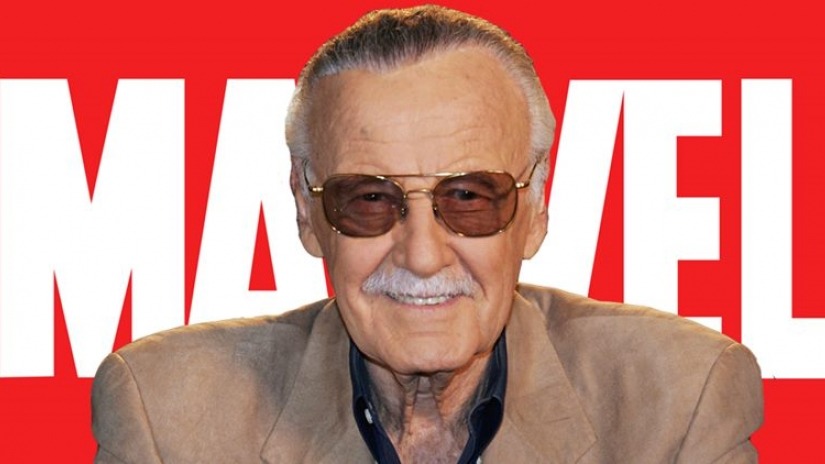
On 12th November 2018, Stan Lee tragically passed away in California, at the age of 95, following an increasingly tough year. His wife of 70 years died on July 6th 2017, and from there Stan Lee had fallen ill multiple times, yet he maintained a good public attitude. Even releasing an initially sincere video declaring he was in good health and ending with a joke. However, it went downhill from there as he was accused multiple times of sexual assault by his nurses. He stated that he was being blackmailed and changed to a nursing home who described him as “polite, kind and respectful”. These were then followed by multiple claims of elder abuse, all of which he denied. He was otherwise described as “happy”.
His death has affected the world and he has been honored by all those associated by him. One memorable story of his life was before he wrote the Fantastic Four and was just about ready to give up on comic to the formulaic structure the characters followed. This was until his wife told him to write what he knew, and thus he created one of the most relatable superhero teams. He went on to create many more characters, including one of the most iconic superheroes (that being Spiderman).
Our world has lost an icon, and Stanley Lieber will be remembered by all as a legend, and will be sincerely missed
By Joe M
Previously on BBC Young Reporters...
Audio Report - Academic Achievements a A-level as sixth-formers
study four A-levels, including Welsh Baccalaureate
Audio Report on Sanitary Towel Campaign
CHRISTMAS SPIRITS SPREAD AS LLANTWIT MAJOR HOSTS
ANNUAL TEA PARTY
Over the last eight years, Llantwit Major Comprehensive School has made it a yearly tradition to welcome over 50 senior citizens of Llantwit to the school to host a festive tea party.
On Wednesday 6th December 2017, the school opened its doors once again to the senior citizens of the local community.
Throughout the day, pupils and staff provided entertainment and refreshments for the special visitors. The Year 13 catering students provided a fabulous feast for all.

The service started with a speech from Assistant Head, Mr Francis, and was soon followed by performances from the school choirs, and orchestra. Year Nine pupil, Shanti Bowen Damhus, performed Silent Night on the piano. Caitlin Doleman, a Year 13 pupil, sang ‘Have Yourself a Merry Little Christmas’. This was followed by Tom Colgan, who took centre stage when he sang ‘The Christmas Song’. Then the senior choir - pupils from years 9-13 - sang ‘Mary Did You Know?’
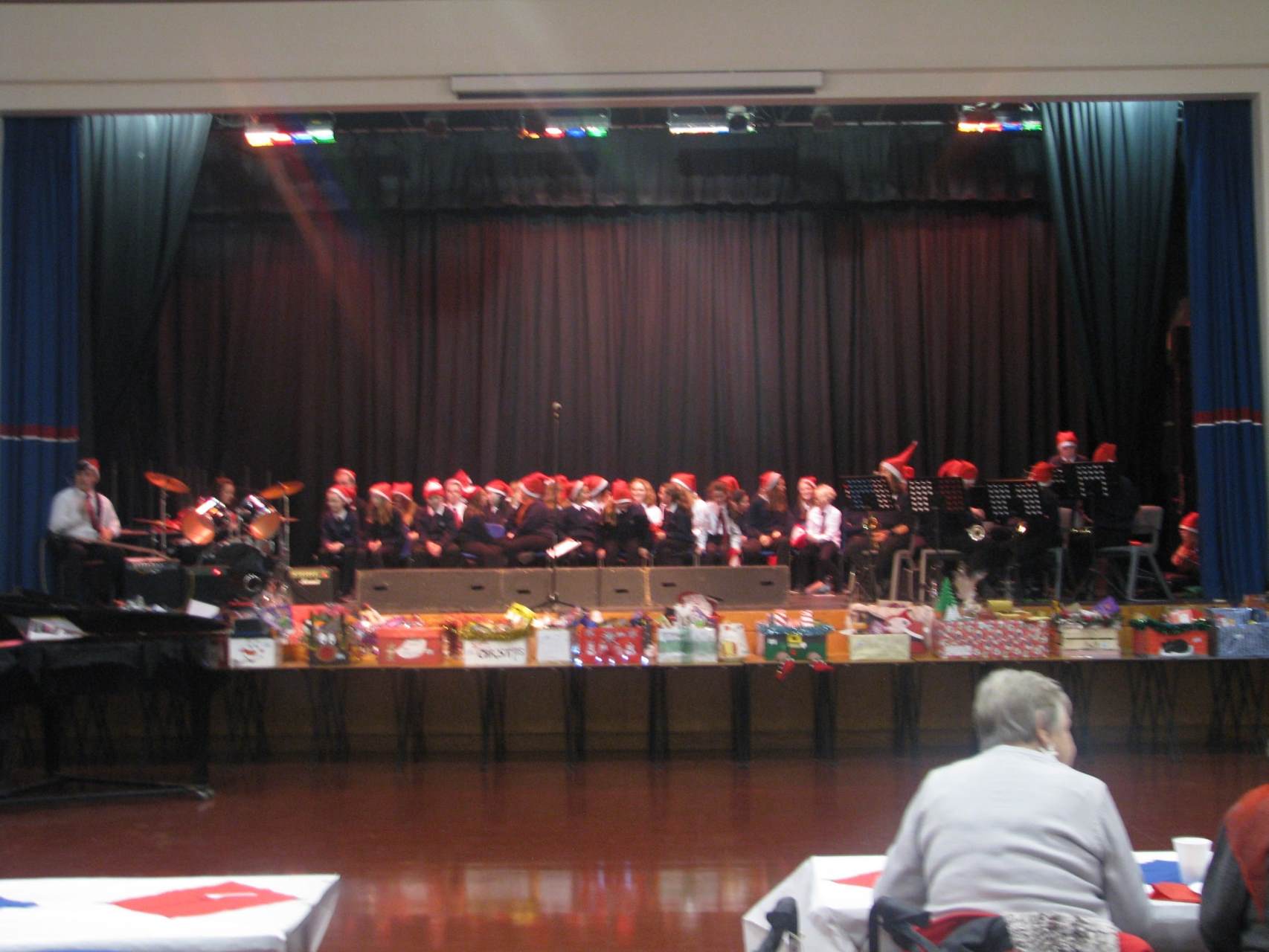
After the musical medleys there was a drama performance by some Year Nine pupils, Bethan Scholes, Mia Griffiths-Price, Lily Starkey, Iona Wilkinson and Josh Kirkham. They performed the drama performance previously at St Illtyd’s Church on Tuesday 5th December.
The citizens loved to see such young faces perform such beautiful pieces of music; their applause filled the hall and some tears were shed!
During the performances we asked one of the organisers, Mrs Davis, how she felt this event had impacted the senior citizens. She replied with, “It gives the senior citizens the opportunity to talk to people they might not get anywhere else.”
To close the day, the senior choir sang ‘Merry Christmas Everyone’ whilst the senior citizens were presented with their handmade hampers.
Throughout December, students of Llantwit Major School had been busily crafting festive displays for the senior citizens, with each form contributing a donation to help make their Christmas special.
This was the 8th annual celebration tea party the school had held and the school says it will not be the last.
By Wesley B and Joe M
16 year old Millie Competes for Great Britain
In September 2017 a Year 12 pupil of Llantwit Major School, Millie, who is only sixteen years old competed for Great Britain in the under 18’s youth life saving team. Millie competed successfully in 3 events over 3 days. In the surf ski she came 3rd in the world, sprint 4th and 3rd in the team.
 |
Millie’s interest in lifeguarding started when she was only six years old, when she went to watch a race but was asked to fill in at the last minute - and won! Her main inspiration is her mum who was also a lifeguard ,competing for Wales in California. Millie said her hardest competition was in the European championships because there were a lot of heats and as she did exceptionally well the competition was a lot tougher.
In Order to keep fit and maintain her ability, Millie trains 11 times a week with no rest days. Millie is currently training to compete in sprint kayaking and would love to take this further, possibly lifeguarding as a career. Sadly there are not currently many opportunities to be employed using lifeguarding skills in the UK but Millie would love to move to Australia and work full time on their beaches. |
Let’s hope we see Millie as world champion the near future
Millie told us “it's a sacrifice seeing my friends going out together but I really enjoy lifeguard.”
“I love lifeguarding and I really like to do it” Millie told us.
By William H-W
REPORT ON NEW MUGA PITCH
By Joe
MAYOR MERITS MUSICAL TALENT OF LOCAL COMMUNITY
On Saturday February 3rd, our school’s senior choir took part in the annual Mayor’s Concert. The senior choir performed in the concert, and several pupils from the choir also had their own opportunity to perform solo/duets/groups.
 |
Throughout January the choir prepared for the concert, including learning a completely new song and attending choir practise twice a week as opposed to only once. Originally, the choir was meant to be performing a couple of songs, however due to a mix up with the dates they were only able to learn one song in time for the concert. The mix up of dates wasn’t necessarily a bad thing, in fact it was beneficial for the students involved with the choir as it opened up the opportunity for them to perform in the concert by themselves. Arranging this was slightly difficult for the solo performers, as the deadline to get backing tracks sent had already passed. However, Miss Toms, Head of the Performing Arts department, took the time to learn and perform a piano accompaniment for these singers in the short time (I know I could never to that in time!).
On the day of the concert, the students met at St Illtyd’s Church (where the concert was being held) for a sound check. During this time Miss Toms went through the choir’s song to make sure everyone knew the lyrics and that they knew all of the notes they had to sing. After that, she went through the songs with the solo/group singers so that they again knew what they were doing.
The concert started at 7 o’clock, and was split into two parts; our school’s performance was in the first part. The song our choir had chosen to sing was ‘As Long As I Have Music’, and I think it’s fair to say our choir was excellent. Following our choir’s performance were: |
Shanti Bowen-Damhus - Einaudi Piano Solo
Tia-Jade Allen - I Dreamed A Dream
Megan Johnson - Take A Bow (Rihanna)
Llewellyn Brown and Caitlin Dolman - Friendship from ‘Anything Goes’
Llewellyn Brown, Caitlin Dolman and Jess Summers - Can’t Help Falling In Love
Tom Colgan and Ellie-May Williams - De Lovely from ‘Anything Goes’
Tom Colgan - Waving Through A Window from ‘Dear Evan Hansen’
Evermore from ‘Beauty and the Beast’
He Used To Be Mine from ‘Waitress’
Miss Toms from the Performing Arts department said, “I thought the school choir were amazing and presented a programme that was of quality and variety.”

The range of talent from our school just keeps on going!
As well as our school’s performances, there were a variety of wonderful performances throughout the duration of the concert. This included performances from other schools, Major Music and solo performances; vocal and instrumental. The range of talent was seemingly endless! The Mayor of Llantwit Major, Jane Norman (who’s concert it was) said, “ The wealth of talent in our local young people is phenomenal.” I think our school would definitely agree.
Overall, it was a fantastic evening, not only for the performers from our school but for everyone involved.
On Tuesday, February 13th, Aspire students from Year 9 to 11 visited the Sky Studios in London to make up their own news report. Beforehand, the students involved with the trip had to do some research about their topic; Mission to Mars. They split up into four groups, which on the actual day would be the studio each group would be working in, and assigned each other roles, for example; scriptwriter, reporter, and cameraman.
On the day of the trip, students arrived at school at 8:30 ready to take the four-hour journey to the studios in London. During the journey, they stopped at the service station so anyone who had no lunch with them had the chance to buy something, which they could then eat upon arrival at the studios at around 1 o’clock. After arrival the students had to sort out their roles, making sure everyone in each group knew what their roles were and were given the chance to switch roles before filming the report if they wanted.

When everyone had finished their lunch, they were taken on a small tour of the studios, including a view of one of their recording studios for certain sports (in this case golf). The students were shown different types of equipment used in the recording, with detailed explanations of how they work and why they are needed for the recording. One example was the camera used for the recording. Afterwards, the students were shown to the Sky Academy Studios. Here they watched an introduction video for the Academy, finding out what they had to do and what skills they needed to complete their news report. In total there were five important skills that were needed.

For the recording of the news report, the students had to review their scripts and had the chance to change anything they wanted to, before actually filming the report. After that, the students could go to a dressing room and put on different items of clothing, for example blazers, hats, headbands and so on. As soon as they had finished choosing their clothes (and having a bit of fun with it) the students returned to their studios ready for filming. The filming of the report was split between the four studios; Studio 1 did the introduction, Studio 2 filmed ‘on location, Studio 3 did the eyewitness interviews and Studio 4 filmed the expert interviews. To actually record the new report, the cameramen used iPads connected to a larger camera, as opposed to using the full camera. The footage was then edited by the editors to ensure any takes that went wrong were cut out and the footage was of a high standard. Next came the overview. This was only recorded in certain studios, and a few students (no matter what their roles were) could choose facts relating to their part of the topic and voice record them. These recordings were then played on top of pictures relating to each fact. Although it didn’t quite seem like that long, the time it took to do all of the recording was actually around two / two and a half hours. All of the recordings from each studio were then sent off to be put together.

Mrs Birt, one of the teachers on the trip, said, “It was an interesting, challenging experience. It gave the students an opportunity to use their communication, presentation and teamwork skills, and I think it should be run again but with different students involved.”
After the recording, the students were taken to the Sky Sport studio, where they were able to see the actual set where they do interviews. For confidentiality purposes the students weren’t able to take pictures and weren’t able to watch for long, but it’s fair to say it was an unforgettable experience for most. The students returned to the Academy Studios shortly afterwards and were able to see their completed news report. They were also given USB wristbands with a copy of the final report saved on it.
After receiving these gifts, the students collected their belongings and got themselves ready to take another four hour journey back to the school. Full of excitement from the day’s events, the students returned to school at about 8 o’clock that evening.
For everyone, it’s safe to say it was a fantastic experience and the trip should most certainly be run again for future students.
By Tia-Jade A
On the 28th of November, the pupils in Year 10 at Llantwit Major School took part in an all-day activity for the 'Enterprise and Employability' part of their Welsh Baccalaureate course. The pupils had to work together in groups to create a product of a specific theme, this year being 'wearable technology'.
Throughout the day pupils had to write and prepare for their company’s pitch as well as create a display board to use as part of their persuasive pitch. Pupils were given two hours in the morning to make a display board promoting their product, containing different pieces of information about their product (including cost, the logo and/or a picture of their product, their target audience etc.)
The deliverance of the pitches started at 11:10 in the morning, so some pupils decided to dedicate their form and break time to work on their display boards to make sure they were finished in time. With such little time to prepare, time management and organizational skills were paramount. However, despite the time limit, the pupils managed to pull it off excellently - designing some fabulous boards and delivering strong pitches. Betsy Downes (who had to make the display board and deliver her pitch by herself) said, "It was pretty hard doing everything by myself because I had to basically take on everyone else's jobs, make the display board and talk about all the different parts of it even if I didn't understand it. It was really stressful. I think it went okay though, but it would've been a lot easier if I did it with my group."
I think most would agree that the morning was quite a challenge, but it certainly didn't stop anyone or slow them down. Everyone's hard work and effort was definitely evident in the final result, which was highly commended in the assembly at the end of the day. Rhodri Richards, part of the group Hot Headed, commented, "The display boards looked really good. Everyone worked really hard and put in loads of effort. It was great. Some groups were given awards and named the winners, but I think everyone was a winner on that day."
As said by Rhodri, certain groups were chosen to receive awards based on their display boards, pitches, innovative ideas, and as overall winners based on all three components. The awards given were as follows:
Best Pitch - Massaging Slippers
Best Display Board - Technology Ring
Most Innovative Idea - Customcase
Overall Winners:
1st - Customcase
2nd - Hot Headed
3rd - Betsy Downes
Ellie Morgan, a member of the group Customcase, said, "I enjoyed the day, it was the best Welsh Bac day we've had so far. Everyone was working well together in their groups and there wasn't a lot of arguing. I'd like to do it again in future, but with a different theme."
With an excited buzz from the pupils, it could be that the next step: Dragon’s Den!

 Llantwit Major School
Llantwit Major School 